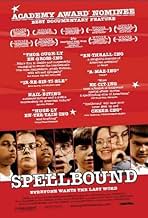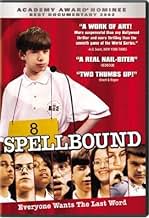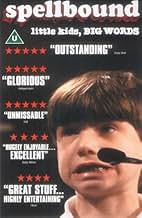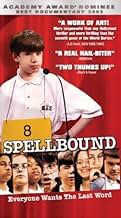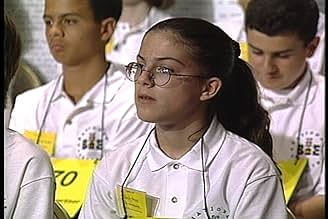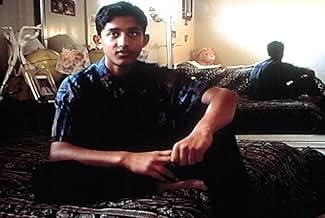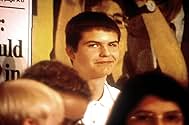CALIFICACIÓN DE IMDb
7.6/10
13 k
TU CALIFICACIÓN
Spellbound sigue a ocho adolescentes en su búsqueda por ganar el Concurso Nacional de Ortografía de 1999.Spellbound sigue a ocho adolescentes en su búsqueda por ganar el Concurso Nacional de Ortografía de 1999.Spellbound sigue a ocho adolescentes en su búsqueda por ganar el Concurso Nacional de Ortografía de 1999.
- Nominado a 1 premio Óscar
- 17 premios ganados y 19 nominaciones en total
Ubaldo Arenivar
- Self - Angela's Father
- (as Ubaldo)
Jorge Arenivar
- Self - Angela's Brother
- (as Jorge)
Scott McGarraugh
- Self - Ranch Owner
- (as Mr. McGarraugh)
Lindy McGarraugh
- Self - Ranch Owner
- (as Mrs. McGarraugh)
Concepción Arenivar
- Self - Angela's Mother
- (as Concepción)
Neelima Marupudi
- Self - Potter County Champion
- (as Neelima)
Parag Lala
- Self - Nupur's Father
- (as Parag)
Meena Lala
- Self - Nupur's Mother
- (as Meena)
Kuna Lala
- Self - Nupur's Brother
- (as Kuna)
Tim Brigham
- Self - Ted's Brother
- (as Tim)
Earl Brigham
- Self - Ted's Father
- (as Earl)
Opiniones destacadas
Doesn't it matter what the words mean more than the letters in them? Wouldn't it do a precocious kid more good to pour over Shakespeare or Jane Austen or Hemingway or even Harry Potter than to turn the pages of a dictionary or be drilled by a parent on how to spell obscure words like "lycanthrope" and "cephalalgia" (or the supremely ironic last word in the final shown here, "logorrhea") which the parents themselves can't even pronounce? When little showoff Harry Altman stumbles and comically grimaces over the word "banns," it seems to me he might be doing better not in the contest, perhaps, but in life to read more books, so he'd become familiar with the custom of "posting the banns," which isn't so obscure as the film and Harry make out, if you've gathered a wide acquaintance with marital customs through reading.
But there is after all a higher significance in all this. America is a self-made country and English in some queer sense is a self-made language, and these general points play into the significance of this surprisingly moving and thought-provoking little film. It's not only the suspense and emotion Spellbound evokes or its fairly tight documentary organization but such more general themes as social mobility and the accessibility of certain sports that make this otherwise conventional movie rise above the ordinary and explain why it's worthy of theatrical distribution and not just a slot on PBS. What would this be like in Italian? That's a language, like some others, whose spellings are so phonetic that a contest like this wouldn't make much sense. But English spellings really don't make much sense. English poses unique problems. The Italian columnist Beppe Severgnini is wrong to have written that it's because we're terrible spellers that spelling bees excite us. An Italian just can't understand. If you say an Italian word, ninety-eight percent of the time (if you're Italian) you know how to spell it. In English, we've got all those tiny vowel differences and remnants of Germanic gutturals and all those endless words from Arabic and Persian and Greek and a hundred other languages that we've transliterated by a hundred different unrelated systems. Why should `Darjeeling,' which so ironically almost stumps the Indian-American Neil Kadakia, be spelled that way and not darjiling or dardjeeling, or who knows what? It's because English spelling had no strict rules till the late nineteenth century; English went through so many growing pains from Chaucer to Shakespeare to Dryden to Jane Austen; because we still have no consistent phonetic system; and because our language has all those endless half-assimilated loan words from other cultures and tongues, that spelling in English is a nightmare and a kind of art, and a truly expert young speller is a real entity worth the chimerical task of seeking him or her out each year.
Spelling bees are a matter of rote knowledge, but success in them can sometimes involve some inspired guessing, and this is shown by the fine tuning contestants are allowed in the DC competition when they ask what language or culture the word comes from. Despite the strong element of memorization, the event attracts and finds ambitious, bright, even rather intellectual kids: lots of hard work maybe, but also some kind of raw brainy talent we don't by any means all have: inspiration and perspiration, the old combination.
The new immigrants in Spellbound are a major force. There are not one but two Indian-Americans in the eight the filmmaker has carefully singled out for special focus, and one of those wins. There's the Mexican girl whose father (so movingly) feels fulfilled, his whole life's journey made worthwhile, just because she has qualified; and he can't even speak English. And there's Ashley, the Black girl from the DC projects who didn't get a trophy or much recognition but dreams, nay prays, to be the winner. And even the boy from rural Tennessee who says there are hardly any other smart kids in his school qualifies as some kind of outsider who magically comes home, and gets put in his place in a complex way, like an Oklahoma valedictorian in the freshman class at Harvard, when he gets to compete in the national spelling bee. .Spellbound itself isn't a profound movie, but it has heart. Like the German WWII film Die Brucke (The Bridge) it shows a group of kids up close and personal and then follows them into battle where one by one they fall, till the last remains, and gets "logorrhea" right (I didn't -- I had to use Spell Check again even though I guessed it right the first time), and becomes champion. And in the emotion of trying so hard and then getting knocked out by one wrong letter, Spellbound illustrates sportsmanship and being all you can be and the joy of competiton and the agony of defeat. It's about poise and maturity and just being a kid. And it's a close, intense analysis of an event a phenomenon, really with more ramifications than we ever realized, till we see it. Spellbound is pretty universal in its appeal and by any accounts it's a wonderful little documentary.
But there is after all a higher significance in all this. America is a self-made country and English in some queer sense is a self-made language, and these general points play into the significance of this surprisingly moving and thought-provoking little film. It's not only the suspense and emotion Spellbound evokes or its fairly tight documentary organization but such more general themes as social mobility and the accessibility of certain sports that make this otherwise conventional movie rise above the ordinary and explain why it's worthy of theatrical distribution and not just a slot on PBS. What would this be like in Italian? That's a language, like some others, whose spellings are so phonetic that a contest like this wouldn't make much sense. But English spellings really don't make much sense. English poses unique problems. The Italian columnist Beppe Severgnini is wrong to have written that it's because we're terrible spellers that spelling bees excite us. An Italian just can't understand. If you say an Italian word, ninety-eight percent of the time (if you're Italian) you know how to spell it. In English, we've got all those tiny vowel differences and remnants of Germanic gutturals and all those endless words from Arabic and Persian and Greek and a hundred other languages that we've transliterated by a hundred different unrelated systems. Why should `Darjeeling,' which so ironically almost stumps the Indian-American Neil Kadakia, be spelled that way and not darjiling or dardjeeling, or who knows what? It's because English spelling had no strict rules till the late nineteenth century; English went through so many growing pains from Chaucer to Shakespeare to Dryden to Jane Austen; because we still have no consistent phonetic system; and because our language has all those endless half-assimilated loan words from other cultures and tongues, that spelling in English is a nightmare and a kind of art, and a truly expert young speller is a real entity worth the chimerical task of seeking him or her out each year.
Spelling bees are a matter of rote knowledge, but success in them can sometimes involve some inspired guessing, and this is shown by the fine tuning contestants are allowed in the DC competition when they ask what language or culture the word comes from. Despite the strong element of memorization, the event attracts and finds ambitious, bright, even rather intellectual kids: lots of hard work maybe, but also some kind of raw brainy talent we don't by any means all have: inspiration and perspiration, the old combination.
The new immigrants in Spellbound are a major force. There are not one but two Indian-Americans in the eight the filmmaker has carefully singled out for special focus, and one of those wins. There's the Mexican girl whose father (so movingly) feels fulfilled, his whole life's journey made worthwhile, just because she has qualified; and he can't even speak English. And there's Ashley, the Black girl from the DC projects who didn't get a trophy or much recognition but dreams, nay prays, to be the winner. And even the boy from rural Tennessee who says there are hardly any other smart kids in his school qualifies as some kind of outsider who magically comes home, and gets put in his place in a complex way, like an Oklahoma valedictorian in the freshman class at Harvard, when he gets to compete in the national spelling bee. .Spellbound itself isn't a profound movie, but it has heart. Like the German WWII film Die Brucke (The Bridge) it shows a group of kids up close and personal and then follows them into battle where one by one they fall, till the last remains, and gets "logorrhea" right (I didn't -- I had to use Spell Check again even though I guessed it right the first time), and becomes champion. And in the emotion of trying so hard and then getting knocked out by one wrong letter, Spellbound illustrates sportsmanship and being all you can be and the joy of competiton and the agony of defeat. It's about poise and maturity and just being a kid. And it's a close, intense analysis of an event a phenomenon, really with more ramifications than we ever realized, till we see it. Spellbound is pretty universal in its appeal and by any accounts it's a wonderful little documentary.
NOTE TO SELF: No typos allowed in this review!
I was an excellent speller in school. I thought I was still pretty good now...until the pre-teen dynamos in 'Spellbound' left me in the dust. As 'Bowling For Columbine's chief competition for the 2002 Best Documentary Oscar, this modest gem about 8 contenders for the '99 National Spelling Bee is thrilling. Read that sentence again. A documentary about spelling is thrilling. Wow! How? Is it gripping to see a kid standing in front of a microphone, desperately trying to figure out how to spell words that most of us can't even pronounce? You bet it is. Who needs guns and explosions? THIS is tension.
When one of the girls crumbles and misspells a word, my heart sank. Really, how can you not root for all of these kids? Each entrant in the competition is a super-smart youngster, and it's not cheesy to say they're all winners for having gotten to the National Bee in the first place. Director Jeffrey Blitz can't focus on all of the spellers, so he chooses to highlight 5 girls and 3 boys. We see them at home as they & their families give us the low-down on what makes these brainiacs tick. Then it's off to the Bee, where it's high drama as errors are made and the field is whittled down, one by one.
I was cheering for all of Blitz's star spellers, but Harry Altman was my favourite. He's a hyperactive weirdo and I liked him immediately. Harry is the stand-out oddball in a group of diligent, nerdy types who share the stage. As engaging as he is, it's wonderful that this contest allows for quiet, shy, so-called geeks to be stars. This is the Super Bowl for scholars and it showcases kids from all backgrounds. Plus, there are about as many girls as there are boys. Truly, if you're a great speller, that's good enough.
'Spellbound' is the rare documentary that's more entertaining than it is informative. The kids reveal a great deal about themselves in the interviews, but the film is always building to the climactic moment when one of the last two children makes a mistake and the other wins the crown. You might be surprised by the result, although you shouldn't be. It's almost a 'Hoosiers' moment when the winning speller clinches the title. Every single kid in this movie is a better speller than anybody I know. If they want a job, I could use a proof-reader...even if that proof-reader is a lot smarter than me.
I was an excellent speller in school. I thought I was still pretty good now...until the pre-teen dynamos in 'Spellbound' left me in the dust. As 'Bowling For Columbine's chief competition for the 2002 Best Documentary Oscar, this modest gem about 8 contenders for the '99 National Spelling Bee is thrilling. Read that sentence again. A documentary about spelling is thrilling. Wow! How? Is it gripping to see a kid standing in front of a microphone, desperately trying to figure out how to spell words that most of us can't even pronounce? You bet it is. Who needs guns and explosions? THIS is tension.
When one of the girls crumbles and misspells a word, my heart sank. Really, how can you not root for all of these kids? Each entrant in the competition is a super-smart youngster, and it's not cheesy to say they're all winners for having gotten to the National Bee in the first place. Director Jeffrey Blitz can't focus on all of the spellers, so he chooses to highlight 5 girls and 3 boys. We see them at home as they & their families give us the low-down on what makes these brainiacs tick. Then it's off to the Bee, where it's high drama as errors are made and the field is whittled down, one by one.
I was cheering for all of Blitz's star spellers, but Harry Altman was my favourite. He's a hyperactive weirdo and I liked him immediately. Harry is the stand-out oddball in a group of diligent, nerdy types who share the stage. As engaging as he is, it's wonderful that this contest allows for quiet, shy, so-called geeks to be stars. This is the Super Bowl for scholars and it showcases kids from all backgrounds. Plus, there are about as many girls as there are boys. Truly, if you're a great speller, that's good enough.
'Spellbound' is the rare documentary that's more entertaining than it is informative. The kids reveal a great deal about themselves in the interviews, but the film is always building to the climactic moment when one of the last two children makes a mistake and the other wins the crown. You might be surprised by the result, although you shouldn't be. It's almost a 'Hoosiers' moment when the winning speller clinches the title. Every single kid in this movie is a better speller than anybody I know. If they want a job, I could use a proof-reader...even if that proof-reader is a lot smarter than me.
"Spellbound" is the acclaimed documentary that follows four young contestants in the 72nd Annual National Spelling Bee. One might think a spelling bee wouldn't be an even interesting enough to warrant a documentary. But this is the grand championship of spelling bees, the equivalent of the Super Bowl, the Academy Awards or the Presidential Election. Out of nine million schoolkids, only 249 make it to the finals. The young contestants and their families struggle to make it to the top. It's an exciting and stressful experience for those involved. "Spellbound" covers what these people are going through. You will feel for the young contestants, and want them to win it all. It's thrilling to see these children tackle the most overwhelming words in the English language. One young standout is Harry, the eccentric young boy from New Jersey. He lightens up the doc, and steals the show! You won't understand the prestige and daunting psychology of spelling bees until you see "Spellbound."
Spellbound is a surprisingly moving film, because it is not really about spelling, but about hopes and dreams. There's a lot of love in the film, and it's interesting how different families have different approaches... all the way from hands-off parents to parents hiring drill coaches. The film does a good job of showing the backgrounds of the kids and presenting their personalities. I found myself trying to spell right along with them (unsuccessfully).
Spelling bees promote the worst kind of rote learning, especially when the kids are faced with words they will never use in real life. That's thousands of hours either totally wasted or to be less critical, hours that could have been put to better use, for example, learning creative writing or public speaking. Even so, as one parent says, this is practice to form a habit of perseverance for the future.
The pacing and music were perfect, the way the challenge was presented was clear and straightforward. Excellent film.
Who should see this film:
-- Kids of all ages
-- Everyone else. It's not at all boring.
I'll give Spellbound a perfect 10 out of 10.
Spelling bees promote the worst kind of rote learning, especially when the kids are faced with words they will never use in real life. That's thousands of hours either totally wasted or to be less critical, hours that could have been put to better use, for example, learning creative writing or public speaking. Even so, as one parent says, this is practice to form a habit of perseverance for the future.
The pacing and music were perfect, the way the challenge was presented was clear and straightforward. Excellent film.
Who should see this film:
-- Kids of all ages
-- Everyone else. It's not at all boring.
I'll give Spellbound a perfect 10 out of 10.
If you need proof that fact is indeed more compelling than fiction, look no further than `Spellbound,' a fascinating and aptly named documentary centered on that great American competition for brainiacs known as the National Spelling Bee.
In designing his film, director Jeffrey Blitz has chosen to focus on eight competitors from widely varying racial, geographical and socioeconomic backgrounds, interviewing them and their families before, during and after the competition. In the first half of the film he introduces us to each of the contestants, giving us behind-the-scenes glimpses into their home lives, their study techniques, their aspirations and their attitudes towards competition and the value of dedication and hard work. The common denominators these eight individuals all share are intelligence, drive, determination and a supportive family structure. Even though the pressure of the experience seems almost too much for any youngster to bear, all of these participants come across as levelheaded, sensible individuals who manage to keep it all in a healthy perspective. The parents, too, seem reasonable in their expectations, encouraging their children without placing undue pressure on them and beaming with justifiable pride at their amazing progeny. Yet, for all their seeming `nerdness' and gift for articulation, Blitz makes it clear that these kids are really just kids (albeit highly gifted ones) after all.
In the second half of the film, we move to the competition itself, watching as all except one of the people we have come to know over the course of the film eventually become eliminated (Blitz had the grand good fortune of choosing the eventual winner as one of his subjects). The scenes at the competition itself provide more edge-of-the-seat suspense than a truckload of fictional Hollywood thrillers. You'll find your mind and heart racing as each child endeavors to spell out the arcane, tongue-tying words chosen by the officials for the competition. Throughout the proceedings, the audience is on as much of an emotional roller coaster as the participants and their families. As a filmmaker, Blitz knows that the human face is really a map revealing what is taking place inside our hearts and minds and this he captures with uncanny precision as the children sweat, tear up, furrow their brows and even in some cases act out their thought processes in humorously absurd muggery while formulating their answers.
`Spellbound' succeeds in its twofold purpose: to honor that commitment to competition that has defined what it means to be an American and to demonstrate that achieving in a competitive field using one's mind can be just as exciting and rewarding as achieving one's greatness on a court, field or gridiron. That's a message all too rarely conveyed by American culture.
Watching this film, you will indeed be spellbound.
In designing his film, director Jeffrey Blitz has chosen to focus on eight competitors from widely varying racial, geographical and socioeconomic backgrounds, interviewing them and their families before, during and after the competition. In the first half of the film he introduces us to each of the contestants, giving us behind-the-scenes glimpses into their home lives, their study techniques, their aspirations and their attitudes towards competition and the value of dedication and hard work. The common denominators these eight individuals all share are intelligence, drive, determination and a supportive family structure. Even though the pressure of the experience seems almost too much for any youngster to bear, all of these participants come across as levelheaded, sensible individuals who manage to keep it all in a healthy perspective. The parents, too, seem reasonable in their expectations, encouraging their children without placing undue pressure on them and beaming with justifiable pride at their amazing progeny. Yet, for all their seeming `nerdness' and gift for articulation, Blitz makes it clear that these kids are really just kids (albeit highly gifted ones) after all.
In the second half of the film, we move to the competition itself, watching as all except one of the people we have come to know over the course of the film eventually become eliminated (Blitz had the grand good fortune of choosing the eventual winner as one of his subjects). The scenes at the competition itself provide more edge-of-the-seat suspense than a truckload of fictional Hollywood thrillers. You'll find your mind and heart racing as each child endeavors to spell out the arcane, tongue-tying words chosen by the officials for the competition. Throughout the proceedings, the audience is on as much of an emotional roller coaster as the participants and their families. As a filmmaker, Blitz knows that the human face is really a map revealing what is taking place inside our hearts and minds and this he captures with uncanny precision as the children sweat, tear up, furrow their brows and even in some cases act out their thought processes in humorously absurd muggery while formulating their answers.
`Spellbound' succeeds in its twofold purpose: to honor that commitment to competition that has defined what it means to be an American and to demonstrate that achieving in a competitive field using one's mind can be just as exciting and rewarding as achieving one's greatness on a court, field or gridiron. That's a message all too rarely conveyed by American culture.
Watching this film, you will indeed be spellbound.
¿Sabías que…?
- TriviaIn 2007, it was added to "IDA's Top 25 Documentaries" of all-time by the International Documentary Association ranked #4.
- ErroresWhile interviewing Harry in his room the boom mic is deliberately shown after Harry asks "Is that thing edible?"
- Citas
Harry Altman - Spelling Bee Participant: Does this sound like a musical robot?
- Créditos curiososThere is no cast list; a cast member is considered credited if a subtitle or an item in the film prints the name (or partial name).
- ConexionesFeatured in The 2003 IFP Independent Spirit Awards (2003)
Selecciones populares
Inicia sesión para calificar y agrega a la lista de videos para obtener recomendaciones personalizadas
- How long is Spellbound?Con tecnología de Alexa
Detalles
Taquilla
- Total en EE. UU. y Canadá
- USD 5,728,581
- Fin de semana de estreno en EE. UU. y Canadá
- USD 17,508
- 4 may 2003
- Total a nivel mundial
- USD 7,457,710
Contribuir a esta página
Sugiere una edición o agrega el contenido que falta



